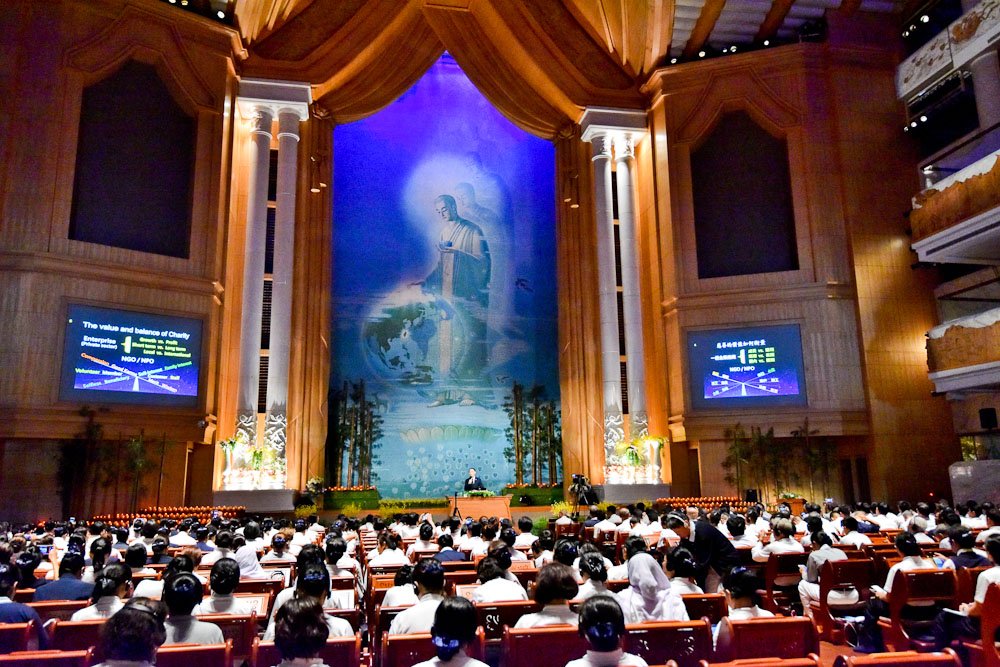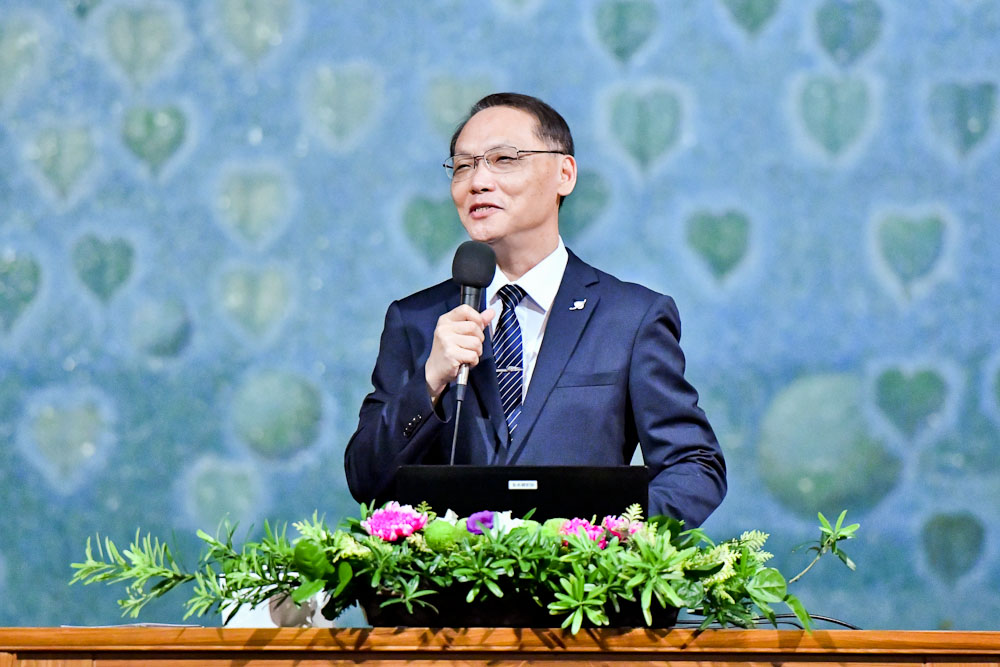Written by Cai Cui-Rong, Li Zhi-Cheng Photographed by Lin Jia-Ru
Translated by Lee Jodie Proofread by Mindy Chen
Mr. Yen Po-Wen, CEO of Tzu Chi Foundation, reviewed what Tzu Chi did when the 921 earthquake stroke Taiwan 20 years ago.
"Under a time constraint, I share only one theme with you today." On the afternoon of September 13, Mr. Yen Po-Wen, CEO of Tzu Chi Foundation, reviewed what Tzu Chi did when the 921 earthquake stroke Taiwan 20 years ago.
"Because I myself didn’t participate in the disaster relief mission during the 921 earthquake, I have a slight hesitation in talking about Tzu Chi’s disaster relief model," Mr. Yen said. He expressed that although he is quite familiar with this story through having reviewed and listened to it for years, he, however, is not sure whether he can present it well or not.
Mr. Yen started his sharing with two "Whys." Firstly, "Why do I seldom talk about Dharma?" He said modestly, "I prefer to talk about technology and sustainability rather than talk about Dharma." I am afraid that what I say will mislead people due to my misunderstanding.”
Secondly, "Why do I often talk about sustainability?" All conditioned phenomena are like a dream, an illusion, a bubble, a shadow. In the universe, there are formation, existence, destruction, and emptiness; birth, aging, illness, and death; arising, abiding, changing and extinction. Therefore, how to be sustainable is a question. For example, in Taiwan, averagely, there are 13 years of sustainable businesses for the small and medium enterprises, 30 years for Fortune 100 companies, and 41 years for Fortune 500 companies. For instance, Kodak has lasted for 130 years. In comparison, Nokia still runs its business now, but people seldom use their products.
In the world, the organizations with lineage are more sustainable. For example, Christianity is practiced by 33% of people, Islam 20%, Hinduism 13% and Buddhism 6%. Jesus and Buddha preached for 3 years and 49 years respectively. Christianity is the largest religion in the world today. However, Buddhism appeared 500 years earlier than Christianity. Therefore, Venerable Dharma Master Chen Yen thinks it’s especially essential to preserve the historical literature in order to pass on the Dharma lineage.
"Sustainability" means there is a sequel forever, but it doesn’t happen naturally. Whether the organization can keep its "Social Return on Investment (SROI) is the key to reach its sustainability;" the organization must win the recognition in the society. After joining Tzu Chi, Mr. Yen found that although Tzu Chi has had many excellent ideas and remarkable models, few people, however, see that. For example, when he joined Tzu Chi ten years ago, he did not know that Tzu Chi helped rebuild 51 schools in the disaster area after the 921 earthquake. He said with mixed emotions, "it’s a pity for Tzu Chi to have such a poor recognition!"
He also mentioned that a company generally pursues short-term profits, while NGOs, like Tzu Chi, focus on great love, compassion, altruism, blessings, merit and so on.
Relative to business profits, how to measure the value of charity? How to balance? That’s all the questions that should be taken into consideration. Mr. Yen said that traditional assessments cannot fully show the value of NGO; currently, the way to evaluate the contribution of charity through SROI is promoted. How can the happiness brought to others be appraised by money? How to tell people how much “money” they will earn if they donate one dollar to Tzu Chi? How much profit will the society make? That is, the profit made should be appraised by the benefits brought to the society. Mr. Yen hopes to be able to announce the results at the end of this year.
Mr. Yen said that Tzu Chi’s Four Missions and Eight Footprints fully correspond to the 17 sustainable development goals promoted by the United Nations (UN). He admires Venerable Dharma Master Cheng Yen for her vision. He said, "Tzu Chi’s good models, excellent spirit, outstanding performance and effectiveness are all worth sharing with others, for instance, silent mentor, international relief, and work-for-relief. Hence Tzu Chi’s models must be recognized in the world.” UN’s work-for-relief is not as successful as that of Tzu Chi because of lacking Tzu Chi’s Dharma Lineage— sincerity, integrity, faith, honesty; Tzu Chi School‘s Four Missions and Eight Footprints are for living beings. They should be shared with people so as to receive recognition and therefore, more people can contribute themselves to these missions as well.
Practice Tzu Chi’s Core Value
In 2018, more than 18 million Tzu Chi volunteers contributed themselves to Tzu Chi missions, and more than 30 million people benefited from their contribution. How can this social value be promoted? Mr. Yen stated that Tzu Chi members work voluntarily, pay fees for activities they participated in, take personal leave, donate presents and donate money. These are the five special features of Tzu Chi members. The economic value generated in 2018 from Tzu Chi members’ contributions is more than NTD 12 billion, which is about twice the total charitable expenditure. The Tzu Chi members’ donation, including money, materials, lands, houses, bone marrow, and even their bodies after passing away, is indeed touching. It might be hard to find another organization like Tzu Chi.
In the 4th Tzu Chi Forum held in 2016, Prof. Herman B. Leonard, the Co-chair of the Social Enterprise Initiative, Harvard Business School, mentioned: how can Tzu Chi swiftly initiate its disaster relief mission? Professor Leonard thought that Tzu Chi is not goal-oriented but action-oriented to practice its core values. Besides, how can Tzu Chi effectively deal with a large-scale disaster with chaos, turmoil and pressure? His answer is that Tzu Chi is not plan-oriented but promise-oriented, one of its core values.
What are the core values of Tzu Chi? ”The core vaules are to cultivate sincerity, integrity, faith, honesty, and to practice kindness, compassion, joy, giving.” Mr. Yen said that he has been witnessing that Venerable Dharma Master Cheng Yen lives her life in alignment with Tzu Chi’s core values.
A big earthquake occurred at 1:47 AM on September 21, 1999, causing serious damage in central Taiwan. Venerable Dharma Master Cheng Yen compassionately initiated the Tzu Chi’s disaster relief mission to help rebuild 51 schools. Mr. Yen said that UN’s coordination mechanism of humanitarian disaster relief - prevention, mitigation, preparedness, relief, response, recovery, reconstruction - is almost the same as Tzu Chi’s disaster-relief model, so called SIX-PEACE; however, Tzu Chi's SIX-PEACE model covers more aspects including peaceful-body, peaceful-mind, peaceful-dwelling, peaceful-schooling, peaceful-life and peaceful-forests.
The earthquake caused the death of more than 2,000 people, the collapse of more than 50,000 houses, and the loss of more than NTD 30 million. Tzu Chi launched three phases of the disaster relief mission: response, recovery and reconstruction. The response phase included tasks like distributing materials, free medical services, offering hot meals, financial aids and caring. The recovery phase included the recovery of livelihood, post-traumatic stress disorder and home. The reconstruction phase included three projects: 921 Hope Project, Health Project, and Public- Facilities Project.
According to some people, Tzu Chi volunteers always appear in the disaster area ahead of other rescue teams. Mr. Yen stated that Tzu Chi volunteers always show up to carry out disaster-relief duties before others and won’t leave until they fulfill duties.
In the end, Mr. Yen said that Venerable Dharma Master Cheng Yen often mentions that walk slightly so as not to hurt the ground; that is, treat sentient beings with compassion. Tzu Chi is a mission-oriented organization. The commissioners of Tzu Chi are people to follow Master’s spirit and vows to fulfill Tzu Chi’s missions. Mr. Yen encouraged TIMA attendees to work for Buddhism and for all beings, not to retreat from Tzu Chi’s missions, to give without asking anything in return and what’s more, to express gratitude all the time.

Mr. Yen is promoting the way to evaluate the contribution of charity through SROI so that the public will understand the social value of Tzu Chi’s charity mission.
